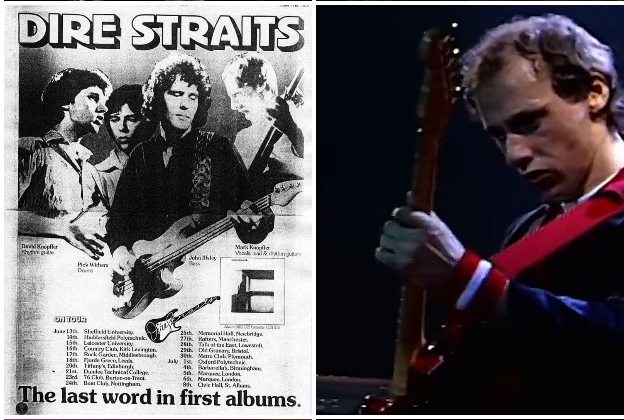With their introspective guitar licks, hushed vocals, and narrative lyrics, Dire Straits stood out from the punk and glam scenes that were crowded in the UK when they first came out in 1977. Under the direction of Mark Knopfler, whose finger-picked guitar became instantly recognizable, the band progressively went from being a barroom unknown to becoming a global force. But they had quietly disappeared by 1995. What, then, caused Dire Straits to split up?

Known for being against rock star antics, Knopfler felt more and more cut off from the persona the band had developed. Dire Straits had outgrown their music by the time Brothers in Arms had sold more than 30 million copies. The closeness that once characterized them had given way to touring stadiums, dealing with constant media attention, and organizing expanding entourages. Given the arena culture of the 1980s, where show frequently took precedence over content, Knopfler’s uneasiness was especially reasonable.
| Category | Details |
|---|---|
| Band Name | Dire Straits |
| Founded | 1977, London, England |
| Founding Members | Mark Knopfler, David Knopfler, John Illsley, Pick Withers |
| Final Lineup Includes | Alan Clark, Guy Fletcher, Hal Lindes, Terry Williams, Jack Sonni |
| Active Years | 1977–1988, 1990–1995 |
| Genre | Roots Rock, Blues Rock, Pub Rock |
| Notable Albums | Brothers in Arms, Love Over Gold, Making Movies, On Every Street |
| Famous Tracks | “Sultans of Swing,” “Money for Nothing,” “Walk of Life,” “Romeo and Juliet” |
| Accolades | 4 Grammy Awards, 3 Brit Awards, 2 MTV Video Music Awards, Rock & Roll Hall of Fame (2018) |
| Website | www.direstraits.com |
Knopfler put the brakes on after their huge 1985–86 tour, which featured a crucial Live Aid performance. He told Rolling Stone that he wished for something more realistic because the media had turned their fame into a bigger focus than their music. Notably, there was no public drama or scandal when the band took a break in 1988.
Expectations were unrealistically high when Dire Straits made a comeback in 1990 with On Every Street. The ensuing tour was incredibly ambitious, with over seven million people attending nearly 300 shows. Even though it was extremely successful, Knopfler found the experience to be emotionally taxing. He later acknowledged that the tour had cost him his marriage and claimed to have felt alienated by the scale during the last leg. He emphasized the silent internal disintegration when he stated the need for “some kind of reality” in a 2012 interview with The Telegraph.
After arguments during recording sessions, David Knopfler, who had co-founded the group with his older brother, had already departed in 1980. Pick Withers, the drummer, left in 1982. Deeper emotional and creative tensions had been alluded to by their departures. The band had expanded over the years to include a number of additional musicians. Despite being technically correct, the lineup adjustments lessened the initial chemistry. Diverse Straits functioned best within a limited, precisely calibrated emotional bandwidth, in contrast to groups that thrive on collaborative chaos—think Fleetwood Mac.
The choice to not get back together wasn’t made hastily. Mark Knopfler handled it with remarkable clarity. He has received innumerable offers of a lucrative reunion over the last thirty years. However, he has continuously refused. He made the firm declaration in 2024 that he would never perform with Dire Straits again. The reunion circuits that are currently typical of legacy acts contrast sharply with this consistency. Bands like Guns N’ Roses and The Eagles have reformed, frequently with varying degrees of success. Knopfler made a different decision, preserving the band’s heritage instead of overstretching it.
The band’s bassist and co-founder, John Illsley, has continued to openly endorse Knopfler’s decision. Rather than expressing disagreement, his remarks imply respect for one another. It appears that both of them value maintaining the honor of what they created together over caving in to nostalgia. In a time when nostalgia frequently turns into money, this restraint is especially commendable.
The cultural heritage of Dire Straits is still very much present. Knopfler’s songwriting is still cited as influential by younger musicians, ranging from indie guitarists to folk revivalists. Artists like John Mayer and Ben Howard are among the generation of musicians who have been influenced by his fingerstyle technique. Their songs, particularly “Romeo and Juliet” and “Sultans of Swing,” have been covered a lot and are still frequently played on classic rock radio stations.
A lesson in graceful exits can also be learned from the band’s quiet disappearance. Their decision to leave without a lavish farewell helped them maintain their mythos. It’s incredibly successful, as fans continue to interact with their catalog out of genuine affection rather than obligation. There isn’t a final album that seems forced or a tour that seems required. Their discography came to an end before they became weary.
Knopfler’s absence during the 2018 Rock and Roll Hall of Fame induction was noticeable but expected. He gave no explanation in public. The decision was in line with all of his prior actions for someone who had avoided the spotlight of fame for years. This dedication to morality above luxury is what makes Dire Straits’ tale so gripping.
Although many people experience a sense of nostalgia when they are not on stage, their music is preserved and unaffected by time. Similar to a meticulously conserved vinyl record, it is in a perfect condition—remarkably resilient, emotionally impactful, and incredibly effective at providing what really counts: sincere, classic music.
